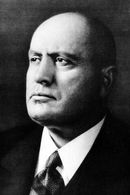Benito Amilcare Andrea Mussolini, a pivotal figure in Italian history, was born on July 29, 1883, in Predappio, Emilia-Romagna, Italy. His father, Alessandro Mussolini, was a socialist who instilled in his son a strong sense of social justice, while his mother, Rosa Maltoni, a devout Catholic schoolteacher, emphasized the importance of morality and values. These contrasting influences would later shape Mussolini's political ideology.
In 1915, Mussolini married Donna Rachele Guidi, and together they had five children. Their marriage was marked by periods of separation and infidelity, yet they remained devoted to each other until Mussolini's untimely death.
Mussolini's rise to power began in 1919 when he became the editor of the fascist newspaper Il Popolo d'Italia. His charismatic leadership and radical ideologies quickly gained him a following, and by 1922, he had become the leader of the National Fascist Party. On October 31, 1922, at the age of 39, Mussolini was appointed Prime Minister of Italy by King Victor Emmanuel III, marking the beginning of his authoritarian rule.
During his 20-year reign, Mussolini implemented a range of policies aimed at centralizing power, suppressing dissent, and promoting Italian nationalism. He also launched a series of aggressive military campaigns, including the invasion of Ethiopia and the annexation of Albania. His foreign policy was marked by a series of alliances and conflicts, including his support for Adolf Hitler's Nazi Germany and his eventual betrayal by the Germans.
In July 1943, Mussolini was removed from power and placed under arrest by order of King Victor Emmanuel III, following a series of military defeats and the Allied invasion of Sicily. However, just two months later, he was rescued by the Germans and installed as the puppet leader of the Italian Social Republic, a German client state.
Mussolini's final days were marked by chaos and desperation. As the Allies closed in on Milan, he and his mistress, Claretta Petacci, attempted to flee to Switzerland but were captured by Italian partisans on April 28, 1945. Mussolini was shot dead by Italian Communists in Giulino di Mezzegra, Lombardy, Italy, and his corpse was hung by its feet as a symbol of his defeat and humiliation.
In the years that followed, Mussolini's legacy was subject to intense debate and controversy. While some saw him as a visionary leader who had modernized Italy and promoted its international prestige, others viewed him as a ruthless dictator who had destroyed democratic institutions and perpetrated numerous human rights abuses.
In 1957, Mussolini's remains were allowed to be interred in the Mussolini family crypt in his hometown of Predappio, where they remain to this day. His tomb has become a place of pilgrimage for neo-fascists and the anniversary of his death is marked by neo-fascist rallies, a testament to the enduring power of his ideology and the ongoing debate over his legacy.





























































